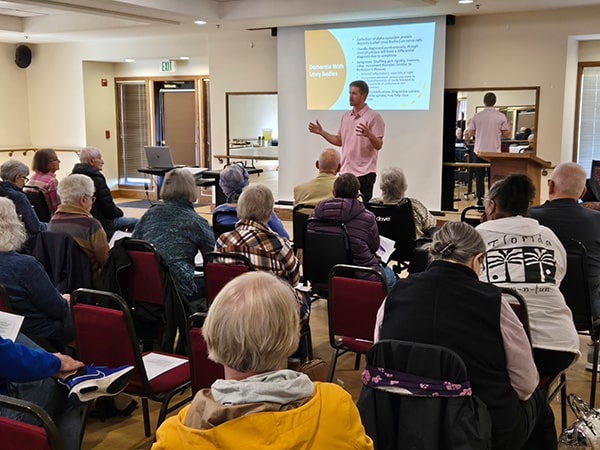Understanding Dementia: Valuable Insights from Jake Gamble
June 24, 2025

At Franke Tobey Jones, we are committed to supporting lifelong learning and meaningful engagement, especially when it comes to topics that touch so many in our community. Recently, we hosted a powerful series of “Understanding Dementia” classes led by Jake Gamble, Administrator at Generations Homecare. With compassion and clarity, Jake helped attendees navigate the complexities of dementia, from early signs and progression to practical caregiving strategies. In this edition, we’re sharing highlights from several Q&A sessions with Jake, offering valuable insights and real-world advice for families, caregivers, and anyone seeking to better understand this challenging condition.
- What are the early signs of dementia?
Early signs include memory loss, confusion, difficulty with language, and trouble completing familiar tasks. Personality or mood changes may also occur. - What’s the difference between Alzheimer’s and dementia?
Dementia is a general term for a decline in cognitive function, while Alzheimer’s is the most common form of dementia. Think of dementia as the umbrella, and Alzheimer’s as one type underneath it. - How do I communicate more effectively with someone who has dementia?
Use short, clear sentences and maintain eye contact. Speak calmly, give them time to respond, and avoid arguing or correcting. - How do I handle aggression or agitation?
Try to identify possible triggers like pain, fear, or overstimulation. Respond with reassurance, a calm tone, and gentle redirection. - Is it okay to “fib” to avoid upsetting them?
This is sometimes called “therapeutic fibbing.” It’s often okay to prioritize comfort and reduce distress over strict honesty. - What should I do if they wander or get lost?
Secure doors and consider alarms or GPS tracking devices. Notify neighbors and register them with programs like Safe Return if available. - How do I know when it’s no longer safe for them to live alone?
If they’re forgetting to eat, wandering, or having trouble with hygiene or medications, it may be time to bring in help or consider a care facility. Safety is the key factor. - Are medications helpful?
Some medications may temporarily slow down symptoms or help with mood and behavior. Talk to a doctor about what’s appropriate for their stage of dementia. - Is it normal to feel angry or frustrated with my loved one?
Yes, it’s very normal. You’re dealing with constant change, loss, and stress. It doesn’t mean you love them any less; it just means you’re human. - How do I cope with the grief of losing them little by little?
This is called ambiguous loss, and it’s one of the hardest parts of dementia. Try to find comfort in small moments of connection and know that it’s okay to mourn even while they’re still here. - How do I forgive myself for mistakes I’ve made along the way?
You’re learning as you go, doing the best you can in an ever-changing situation. Self-forgiveness is part of the journey—you’re not alone, and you’re doing better than you think. - How do I deal with the fact that they don’t always recognize me anymore?
It’s heartbreaking, and there’s no easy answer. Try to focus on the emotions that still connect to your love, safety, and comfort. Even if they forget your name, they can still feel your presence. - What can I do when I just want my old life back?
It’s okay to miss the life you had. That doesn’t mean you’re selfish, it means you’re grieving. Try to make space for your own needs and joys, even in small ways. - Why does it hurt so much to watch them change?
Because you love them. Watching someone you care for slip away bit by bit is a slow heartbreak. Be gentle with yourself and remember that your feelings are valid. - How do I keep going when I’m emotionally drained?
One breath, one moment at a time. Lean on others, even if just to listen. You don’t have to do this alone—and you don’t have to do it perfectly. - What is guardianship, and when might it be necessary in Washington State?
Guardianship is a legal process where the court appoints someone to make decisions for a person who can no longer manage their own care or finances. It’s often avoidable if powers of attorney and advance directives are set up early, so planning ahead is key. - How can I prepare legally and financially for the future if dementia is a concern?
Creating powers of attorney, healthcare directives, and a financial plan can prevent costly and stressful legal steps later. Consulting with an elder law attorney in Washington State can help ensure all documents meet local requirements and reflect your wishes. - What does being “proactive” with dementia care really mean?
Being proactive means anticipating care needs before a crisis—such as identifying support options, evaluating living arrangements, and talking with family about future preferences. Planning early allows for more thoughtful choices and less emotional strain down the road. - How do I know when it’s time to consider Memory Care?
Signs include safety concerns, increased confusion, wandering, and caregiver burnout. Memory Care communities offer structured, secure environments where trained staff provide 24/7 support tailored to the unique needs of those with dementia. - Can I plan for Memory Care even if my loved one doesn’t need it yet?
Yes, and it’s highly recommended. Touring communities, understanding costs, and getting on waitlists early ensures you’re ready to make an informed and timely decision when care needs change. Franke Tobey Jones offers a warm, secure Memory Care community where residents receive personalized attention while maintaining dignity and quality of life. - What is guardianship, and when might it be necessary in Washington State?
Guardianship is a legal process where the court appoints someone to make decisions for a person who can no longer manage their own care or finances. It’s often avoidable if powers of attorney and advance directives are set up early, so planning ahead is key. - How can I prepare legally and financially for the future if dementia is a concern?
Creating powers of attorney, healthcare directives, and a financial plan can prevent costly and stressful legal steps later. Consulting with an elder law attorney in Washington State can help ensure all documents meet local requirements and reflect your wishes. - What does being “proactive” with dementia care really mean?
Being proactive means anticipating care needs before a crisis—such as identifying support options, evaluating living arrangements, and talking with family about future preferences. Planning early allows for more thoughtful choices and less emotional strain down the road. - How do I know when it’s time to consider Memory Care?
Signs include safety concerns, increased confusion, wandering, and caregiver burnout. Memory Care communities offer structured, secure environments where trained staff provide 24/7 support tailored to the unique needs of those with dementia. - Can I plan for Memory Care even if my loved one doesn’t need it yet?
Yes, and it’s highly recommended. Touring communities, understanding costs, and getting on waitlists early ensures you’re ready to make an informed and timely decision when care needs change. Franke Tobey Jones offers a warm, secure Memory Care community where residents receive personalized attention while maintaining dignity and quality of life. - Can I plan for Memory Care even if my loved one doesn’t need it yet?
Many families find peace of mind by exploring options before the need arises. Visiting Franke Tobey Jones and learning about our continuum of care ensures you’re ready to act with confidence and compassion when the time comes.
Categories: General
![Franke Tobey Jones [logo]](https://www.franketobeyjones.com/wp-content/themes/franktobyjones2017/images/logo-2024.png)

